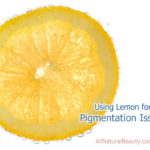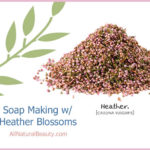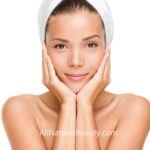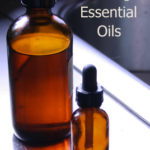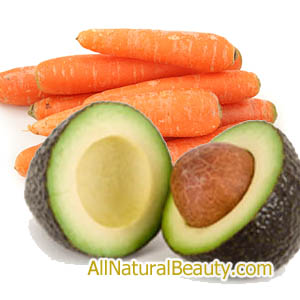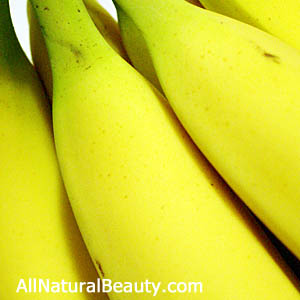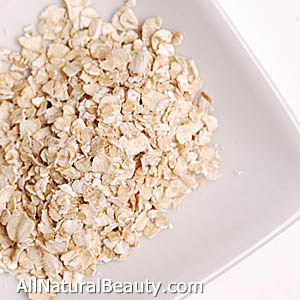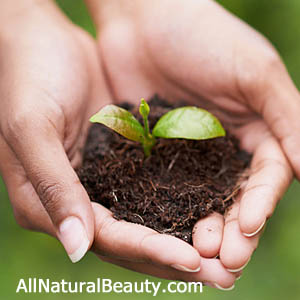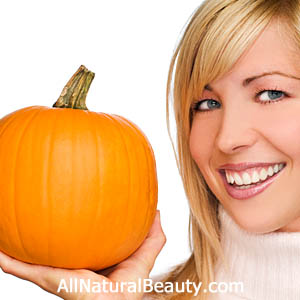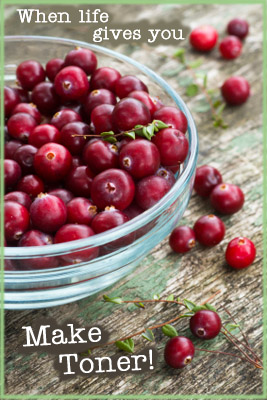
When I think of fall, I think of cranberries! Cranberry is a wonderful ingredient to use in skin care: it is antioxidant rich and helps improve skin clarity. Here is my recipe for my cranberry toner. I have combined two of my favorite skin care ingredients (roses and cranberries) to make one fantastic toner!
Li’s Cranberry Toner
3/4 oz rose hydrosol
¼ oz cranberry juice
½ teaspoon vegetable glycerine
Instructions:
Add all of the ingredients to a bottle and shake well. Be sure to shake well before each use. Apply with a cotton ball or mist the skin and then use a cotton ball afterwards. Store in the fridge. This has a shelf life of a few days to a week.
Information on the ingredients:
Rose hydrosol or rose (floral) water:
Rose hydrosol is distilled from rose petals. This fragrant, refreshing hydrosol hydrates and softens the skin. It is an excellent choice for all skin types, including dry, dehydrated, oily, normal, and combination skin. It is mildly astringent, balances sebum levels, and is a great ingredient for blemished skin. It is also called rose water or rose distillate. Try to use organic rose hydrosol in this recipe, if possible!
When buying hydrosols, make sure you are buying the real deal. Sometimes a different product made from distilled water and essential oils are also called floral/flower waters, or mistakenly called ‘hydrosols’. While this is a nice product, it is not the same thing as a real hydrosol (I personally call these products ‘aromatherapy sprays’ to distinguish them from true hydrosols. See my link below for my recipe for aromatherapy sprays).
Hydrosols can greatly range in quality. Often hydrosols are the by-product of essential oil production (so the plants are distilled for the essential oil, and distillers package the wastewater to sell. This produces a lower quality hydrosol; quality can range from poor to okay to good). While in higher quality hydrosols, plants are distilled for the hydrosol itself (which produces excellent or superior quality hydrosols).
Hydrosols can be found online (many natural skin care companies, aromatherapy vendors, or diy/herbal ingredient supplies carry them). They can be found locally in health food stores, in the alcohol section of many super markets, and in middle eastern shops, but be sure to read the labels carefully (since many hydrosols found in local shops may be the by-products of essential oil production (i.e. lower quality), though some hydrosols found in the cosmetic/beauty section of health food stores are higher quality hydrosols).
If you can’t find rose hydrosol, you can either substitute a different hydrosol (the properties will be different, although it will still hydrate), aloe, or distilled water.
Cranberry juice:
A lot of cranberry juice brands add corn syrup, sugar, or other additives, so I recommend getting one that is 100% juice. Cranberry apple or cranberry raspberry blends are lovely for skin care. Cranberry juice is rich in vitamin C, and has fruit acids and enzymes in it that mildly exfoliate the skin (though cranberry juice mildly exfoliates, cranberry toner is safe to use daily. But if you use an exfoliating toner every day, you may or may not need to cut down on other forms of exfoliation).
Vegetable glycerine:
Vegetable glycerine is a well-known humectant, which helps hold moisture to the skin. It also helps extend the shelf life of the toner (the amount of glycerine in this recipe is not enough to preserve long term, but it will help keep the toner fresh for a few more days). If you choose not to add glycerine to the toner, then use the toner up within a few days. Rose water and glycerine is a traditional cosmetic, which has been used by many generations and cultures for soft, hydrated skin. Vegetable glycerine can be found online, or in local stores (in pharmacies, or in the beauty section of stores).
Li has over two decades of plant knowledge and experience! She is an aromatherapist (trained in clinical aromatherapy and advanced aromatic medicine), herbalist (trained in family, community, and clinical herbalism), natural perfumer, natural formulator, eco living writer, and environmental scientist/biologist.
×
Li has over two decades of plant knowledge and experience! She is an aromatherapist (trained in clinical aromatherapy and advanced aromatic medicine), herbalist (trained in family, community, and clinical herbalism), natural perfumer, natural formulator, eco living writer, and environmental scientist/biologist.



